- Home
- Anthony Burgess
A Clockwork Orange (UK Version)
A Clockwork Orange (UK Version) Read online
A Clockwork Orange (UK Version)
Anthony Burgess
In Anthony Burgess’s A Clockwork Orange, Burgess creates a gloomy future full of violence, rape and destruction. In this dystopian novel, Burgess does a fantastic job of constantly changing the readers’ allegiance toward the books narrator and main character, Alex. Writing in a foreign language, Burgess makes the reader feel like an outsider. As the novel begins, the reader has no emotional connection to Alex. This non-emotional state comes to a sudden halt when Alex and his droogs begin a series of merciless acts of violence. The reader rapidly begins to form what seems to be an irreversible hatred toward the books narrator. However, as time progresses, Burgess cleverly changes the tone of his novel. Once wishing only the harshest punishments be bestowed upon him, it is these same punishments that begin to change how the reader feels. In fact, by the end of the book, one almost begins to have pity for Alex. The same character that was once hated soon emerges as one of many victims taken throughout the course of the book. Throughout Alex’s narration, Burgess manages to change the readers’ allegiance toward a once seemingly evil character.
Alex is the type of character one loves to hate; he makes it all too easy to dislike him. He is a brutal, violent, teenage criminal with no place in society. His one and only role is to create chaos, which he does too well. Alex’s violent nature is first witnessed during the first chapter, and is soon seen again when Alex and his gang chose to brutally beat an innocent drunkard. This beating off the homeless man serves no purpose other then to amuse Alex’s gang. The acts committed were not performed for revenge, the one reason given was that Alex did not enjoy seeing a homeless drunk, “I could never stand to see a moodge all filthy and rolling and burping and drunk, whatever his age might be, but more especially when he was real starry like this one was”. Alex continues to explain his reason for dislike, “his platties were a disgrace, all creased and untidy and covered in cal”, from this explanation one realizes his reasons for nearly killing a man are simply based on pleasure, desire, and a dislike toward the untidy. By the end of the second chapter Burgess’s inventive usage of a different language to keep the reader alienated from forming opinions about Alex ceases to work. At this point in time Alex’s true nature is revealed, and not even his unfamiliar Nadsat language can save him from being strongly disliked by the reader.
The more the reader learns of Alex, the more and more he is disliked; Alex’s relationship with his parents only builds on ones already negative opinions toward Alex. Coming from a normal family and a sturdy household free of domestic violence, there is no excuse for Alex’s violent nature. In fact, Alex’s loving parents are just as baffled by his immoral personality as the reader, although because of their naivete, they know much less of what he does. This leaves the reader uninformed and wondering: why is Alex the way he is? Fortunately, just as one begins to question Alex’s motives, Alex gives an answer, “badness is of the self, the one…is not our modern history, my brothers the story of brave malenky selves fighting these big machines? I am serious with you, brothers, over this. But what I do I do because I like to do”. He could not have explained it more clearly. While from one point of view Alex visions himself as a revolutionary, even simpler then that, he is basically admitting he commits violent acts because he enjoys doing so. Later in the book Alex offers another solution for his violent nature, “Being young is like being one of these malenky machines…and so it would itty on to like the end of the world”. These malenky machines he is referring to are very similar to the clockwork orange Burgess talks to in his introduction. Whatever reasons he gives, none of them are valid enough to prevent the reader from hating Alex.
In spite of all the hatred aimed toward Alex at this point, seemingly it is not enough to prevent the pity one begins to feel when Alex is abandoned by his “droogs”. Knowing he is the leader of his group, Alex constantly gives orders to his gang. Unfortunately it is due to his tendency to need leadership that a quarrel begins with his gang. After settling the original dispute that arises, Alex and his “droogs” are not so successful at ending their second squabble. Framed by his friends, Alex is arrested while they run away. Furthermore, he is beaten by the police, and sentenced to fourteen years of jail. It only takes two of them for the reader to realize the difficulties that Alex is living through. Throughout the first part of the book, there is in fact only one sign that Alex is not utterly evil, that being his music. Along with his abandonment from friends, it is the music that Burgess uses to help change the readers opinion, and eventually to have pity toward his young antagonist.
As the reader continues to pry deeper into Alex’s life it is shocking to learn of the music he listens to, it is because of this music and the actions taken against him that one truly begins to feel sorry for Burgess’s little Alex. The music that Alex chooses to listen is very ironic. While it causes him to do evil things, the fact remains that he listens to normal music, one of the first things he is not disliked for, “lying there on my bed with glazzies tight shut and rookers behind my gulliver, I broke and spattered and cried aaaaaaah with the bliss of it". His particular interest in Ludwig Van arises during one of his sessions while undergoing Ludivico’s Technique. Upon hearing what he perceives to be heavenly music Alex cry’s out about the injustice in the procedure, “I don’t mind about the ultra-violence and all that cal. I can put up with that. But it’s not fair on the music”. It is during this same treatment that the reader really begins to feel sympathy toward him. Striped of his ability to choose right from wrong, and now the same clockwork orange that F. Alexander earlier told him about, Alex becomes one of the governments’ machines. Forced to do exactly what they want him to, become their “true Christian”, Alex poses the question to his doctors, “How about me? Where do I come into all this? Am I like just some animal or dog…am I to be just like a clockwork orange?” Alex is all alone in the world, no longer capable of performing cruel deeds, he is denied by all whom he once knew. The same character one used to wish the harshest punishment upon received it, and when he got it, it becomes strikingly evident that it was much more then even the worst person would ever deserve.
Burgess does a magical job at making the reader quickly forget the horrible deeds Alex once committed. Instead by making powerful moral statements, Burgess goes so far that the reader not only turns the other cheek toward Alex’s crimes, but also feels genuinely sorry for him. Alex may not be completely cured, but that is not the issue at hand. Through means of pity and by playing with the readers’ emotions throughout the book, during A Clockwork Orange, Burgess is constantly playing with the reader’s allegiances.
Anthony Burgess
A Clockwork Orange (UK Version)
Introduction
A Clockwork Orange Resucked
I first published the novella A Clockwork Orange in 1962, which ought to be far enough in the past for it to be erased from the world's literary memory. It refuses to be erased, however, and for this the film version of the book made by Stanley Kubrick may be held chiefly responsible. I should myself be glad to disown it for various reasons, but this is not permitted. I receive mail from students who try to write theses about it or requests from Japanese dramaturges to turn It into a sort of Noh play. It seems likely to survive, while other works of mine that I value more bite the dust. This is not an unusual experience for an artist. Rachmaninoff used to groan because he was known mainly for a Prelude in C Sharp Minor which he wrote as a boy, while the works of his maturity never got into the programmes. Kids cut their pianistic teeth on a Minuet in G which Beethoven composed only so that he could detest it. I have to go on living with A Clockwork Orange, and this means I have a sort of auth
orial duty to it. I have a very special duty to it in the United States, and I had better now explain what this duty is. Let me put the situation baldly. A Clockwork Orange has never been published entire in America. The book I wrote is divided into three sections of seven chapters each. Take out your pocket calculator and you will find that these add up to a total of twenty-one chapters. 21 is the symbol for human maturity, or used to be, since at 21 you got the vote and assumed adult responsibility. Whatever its symbology, the number 21 was the number I started out with. Novelists of my stamp are interested in what is called arithmology, meaning that number has to mean something in human terms when they handle it. The number of chapters is never entirely arbitrary. Just as a musical composer starts off with a vague image of bulk and duration, so a novelist begins with an image of length, and this image is expressed in the number of sections and the number of chapters in which the work will be disposed. Those twenty-one chapters were important to me.
But they were not important to my New York publisher. The book he brought out had only twenty chapters. He insisted on cutting out the twenty-first. I could, of course, have demurred at this and taken my book elsewhere, but it was considered that he was being charitable in accepting the work at all, and that all other New York, or Boston, pub-lishers would kick out the manuscript on its dog-ear. I needed money back in 1961, even the pittance I was being offered as an advance, and if the condition of the book's acceptance was also its truncation-well, so be it. So there is a profound difference between A Clockwork Orange as Great Britain knows it and the somewhat slimmer volume that bears the same name in the United States of America.
Let us go further. The rest of the world was sold the book out of Great Britain, and so most versions-certainly the French, Italian, Spanish, Catalan, Russian, Hebrew, Rumanian, and German translations-have the original twenty-one chapters. Now when Stanley Kubrick made his film-though he made it in England-he followed the American version and, so it seemed to his audiences outside America, ended the story somewhat prematurely. Audiences did not exactly clamour for their money back, but they wondered why Kubrick left out the dénouement. People wrote to me about this-indeed much of my later life has been expended on Xeroxing statements of intention and the frustrations of intention- while both Kubrick and my New York publisher coolly bask in the rewards of their misdemeanor. Life is of course, terrible.
What happens in that twenty-first chapter? You now have the chance to find out. Briefly, my young thuggish protagonist grows up. He grows bored with violence and recognizes that human energy is better expended on creation than destruction. Senseless violence is a prerogative of youth, which has much energy but little talent for the constructive. Its dynamism has to find an outlet in smashing telephone kiosks, derailing trains, stealing cars and smashing them and, of course, in the much more satisfactory activity of destroying human beings. There comes a time, however, when violence is seen as juvenile and boring. It is the repartee of the stupid and ignorant. My young hoodlum comes to the revelation of the need to get something done in life-to marry, to beget children, to keep the orange of the world turning in the Rookers of Bog, or hands of God, and perhaps even create something-music, say. After all, Mozart and Mendelssohn were composing deathless music in their teens or nadsats, and all my hero was doing was razrezzing and giving the old in-out. It is with a kind of shame that this growing youth looks back on his devastating past. He wants a different kind of future.
There is no hint of this change of intention in the twentieth chapter. The boy is conditioned, then deconditioned, and he foresees with glee a resumption of the operation of free and violent will. 'I was cured all right,' he says, and so the American book ends. So the film ends too. The twenty-first chapter gives the novel the quality of genuine fiction, an art founded on the principle that human beings change. Their is, in fact, not much point in writing a novel unless you can show the possibility of moral transformation, or an increase in wisdom, operating in your chief character or characters. Even trashy best-sellers show people changing. When a fictional work fails to show change, when it merely indicates that human character is set, stony, unregenerable, then you are out of the field of the novel and into that of the fable or the allegory. The American or Kubrickian Orange is a fable; the British or world one is a novel.
But my New York publisher believed that my twenty-first chapter was a sellout. It was veddy veddy British, don't you know. It was bland and it showed a Pelagian unwillingness to accept that a human being could be a model for unregenerable evil. The Americans, he said in effect, were tougher than the British and could face up to reality. Soon they would be facing up to it in Vietnam. My book was Kennedyan and accepted the notion of moral progress. What was really wanted was a Nixonian book with no shred of optimism in it. Let us have evil prancing on the page and, up to the very last line, sneering in the face of all the inherited beliefs, Jewish, Christian, Muslim, and Holy Roller, about people being able to make themselves better. Such a book would be sensational, and so it is. But I do not think it is a fair picture of human life.
I do not think so because, by definition, a human being is endowed with free will. He can use this to choose between good and evil. If he can only perform good or only perform evil, then he is a clockwork orange-meaning that he has the appearance of an organism lovely with colour and juice but is in fact only a clockwork toy to be wound up by God or the Devil or (since this is increasingly replacing both) the Almighty State. It is as inhuman to be totally good as it is to be totally evil. The important thing is moral choice. Evil has to exist along with good, in order that moral choice may operate. Life is sustained by the grinding opposition of moral entities. This is what the television news is about. Unfortunately there is so much original sin in us all that we find evil rather attractive. To devastate is easier and more spectacular than to create. We like to have the pants scared off us by visions of cosmic destruction. To sit down in a dull room and compose the Missa solennis or The Anatomy of Melancholy does not make headlines or news flashes. Unfortunately my little squib of a book was found attractive to many because it was as odorous as a crateful of bad eggs with the miasma of original sin. It seems priggish or Pollyannaish to deny that my intention in writing the work was to titillate the nastier propensities of my readers. My own healthy inheritance of original sin comes out in the book and I enjoyed raping and ripping by proxy. It is the novelist’s innate cowardice that makes him depute to imaginary personalities the sins that he is too cautious to commit for himself. But the book does also have a moral lesson, and it is the weary traditional one of the fundamental importance of moral choice. It is because this lesson sticks out like a sore thumb that I tend to disparage A Clockwork Orange as a work too didactic to be artistic. It is not the novelist’s job to preach; it is his duty to show. I have shown enough, though the curtain of an invented lingo gets in the way-another aspect of my cowardice. Nadsat, a Russified version of English, was meant to muffle the raw response we expect from pornography. It turns the book into a linguistic adventure. People preferred the film because they are scared, rightly, of language. I don’t think I have to remind readers what the title means. Clockwork oranges don’t exist, except in the speech of old Londoners. The image was a bizarre one, always used for a bizarre thing. “He’s as queer as a clockwork orange,” meant he was queer to the limit of queerness. It did not primarily denote homosexuality, though a queer, before restrictive legislation came in, was a term used for a member of the inverted fraternity. Europeans who translated the title as Arancia a Orologeria or Orange Mécanique could not understand its Cockney resonance and they assumed that it meant a hand grenade, a cheaper kind of explosive pineapple. I mean it to stand for the application of a mechanistic morality to a living organism oozing with juice and sweetness.
Readers of the twenty-first chapter must decide for themselves whether it enhances the book they presumably know or is really a discardable limb. I meant the book to end in this way, but my aesthetic judgement may hav
e been faulty. Writers are rarely their own best critics, nor are critics. “Quod scripsi scripsi” said Pontius Pilate when he made Jesus Christ the King of the Jews. “What I have written I have written.” We can destroy what we have written but we cannot unwrite it. I leave what I wrote with what Dr. Johnson called frigid indifference to the judgement of that.00000001 of the American population which cares about such things. Eat this sweetish segment or spit it out. You are free.
Anthony Burgess November, 1986
A CLOCKWORK ORANGE (UK Version)
Part 1
1
"What's it going to be then, eh?"
There was me, that is Alex, and my three droogs, that is Pete, Georgie, and Dim. Dim being really dim, and we sat in the Korova Milkbar making up our rassoodocks what to do with the evening, a flip dark chill winter bastard though dry. The Ko Part 1 rova Milkbar was a milk-plus mesto, and you may, O my brothers, have forgotten what these mestos were like, things changing so skorry these days and everybody very quick to forget, newspapers not being read much neither. Well, what they sold there was milk plus something else. They had no license for selling liquor, but there was no law yet against prodding some of the new veshches which they used to put into the old moloko, so you could peet it with vel-locet or synthemesc or drencrom or one or two other vesh-ches which would give you a nice quiet horrorshow fifteen minutes admiring Bog And All His Holy Angels and Saints in your left shoe with lights bursting all over your mozg. Or you could peet milk with knives in it, as we used to say, and this would sharpen you up and make you ready for a bit of dirty twenty-to-one, and that was what we were peeting this evening I'm starting off the story with.

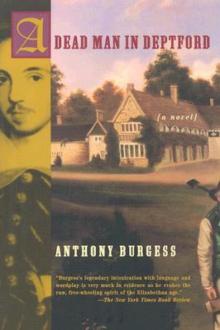 A Dead Man in Deptford
A Dead Man in Deptford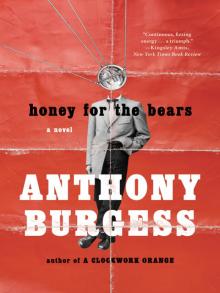 Honey for the Bears
Honey for the Bears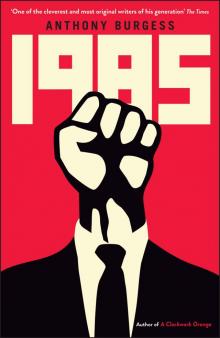 1985
1985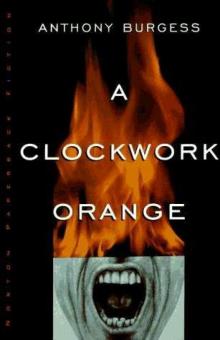 A Clockwork Orange
A Clockwork Orange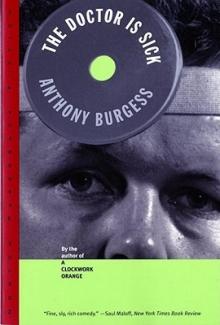 The Doctor Is Sick
The Doctor Is Sick Earthly Powers
Earthly Powers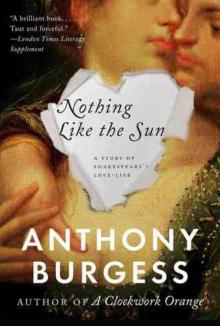 Nothing Like the Sun
Nothing Like the Sun Collected Poems
Collected Poems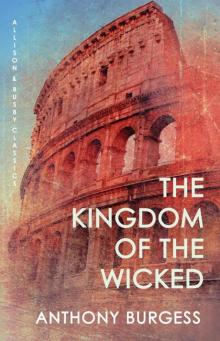 The Kingdom of the Wicked
The Kingdom of the Wicked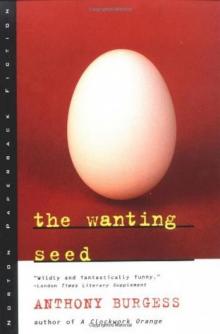 The Wanting Seed
The Wanting Seed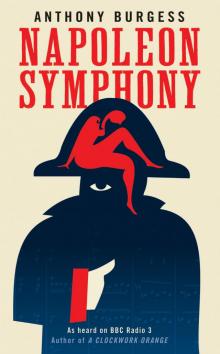 Napoleon Symphony
Napoleon Symphony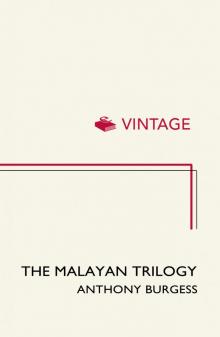 The Malayan Trilogy
The Malayan Trilogy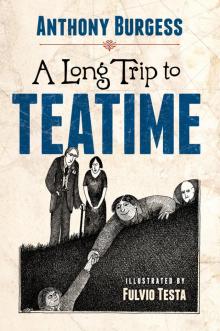 A Long Trip to Teatime
A Long Trip to Teatime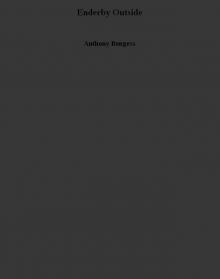 Enderby Outside
Enderby Outside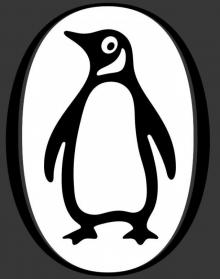 M/F
M/F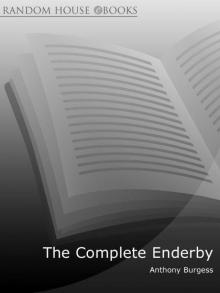 The Complete Enderby
The Complete Enderby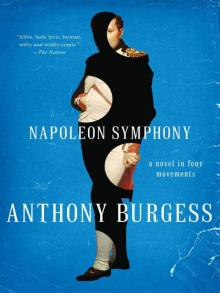 Napoleon Symphony: A Novel in Four Movements
Napoleon Symphony: A Novel in Four Movements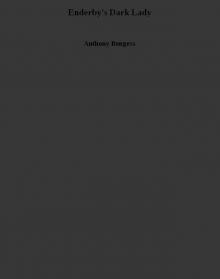 Enderby's Dark Lady
Enderby's Dark Lady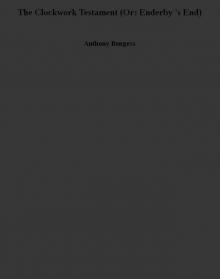 The Clockwork Testament (Or: Enderby 's End)
The Clockwork Testament (Or: Enderby 's End) ABBA ABBA
ABBA ABBA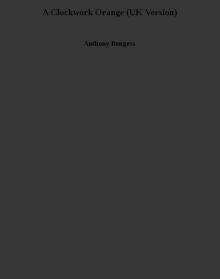 A Clockwork Orange (UK Version)
A Clockwork Orange (UK Version)